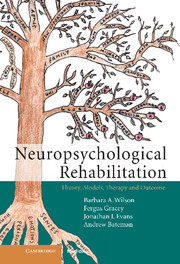Book contents
- Frontmatter
- Contents
- List of contributors
- Foreword by Keith Cicerone
- Preface
- Section 1 Background and theory
- 1 Towards a comprehensive model of neuropsychological rehabilitation
- 2 Evidence for the effectiveness of neuropsychological rehabilitation
- 3 Goal setting as a way of planning and evaluating neuropsychological rehabilitation
- 4 The Oliver Zangwill Centre approach to neuropsychological rehabilitation
- Section 2 Group interventions
- Section 3 Case illustrations
- Section 4 Outcomes
- Index
- Plate section
4 - The Oliver Zangwill Centre approach to neuropsychological rehabilitation
from Section 1 - Background and theory
Published online by Cambridge University Press: 03 March 2010
- Frontmatter
- Contents
- List of contributors
- Foreword by Keith Cicerone
- Preface
- Section 1 Background and theory
- 1 Towards a comprehensive model of neuropsychological rehabilitation
- 2 Evidence for the effectiveness of neuropsychological rehabilitation
- 3 Goal setting as a way of planning and evaluating neuropsychological rehabilitation
- 4 The Oliver Zangwill Centre approach to neuropsychological rehabilitation
- Section 2 Group interventions
- Section 3 Case illustrations
- Section 4 Outcomes
- Index
- Plate section
Summary
Introduction
The Oliver Zangwill Centre (OZC) for Neuropsychological Rehabilitation opened in 1996 and was modelled on the American holistic programmes developed by Yehuda Ben-Yishay and George Prigatano. It was named after Oliver Louis Zangwill, Professor of Psychology at Cambridge University between 1954 and 1984. He was also a pioneer of brain injury rehabilitation in Great Britain during the Second World War when he worked in Edinburgh with brain injured soldiers. The Centre follows many of the principles laid down by Ben-Yishay (1978), Prigatano et al. (1986) and Christensen and Teasdale (1995), and is also significantly influenced by the critical ‘scientist practitioner’ model of clinical psychology adopted in the United Kingdom.
A holistic approach to brain injury rehabilitation ‘… consists of well-integrated interventions that exceed in scope, as well as in kind, those highly specific and circumscribed interventions which are usually subsumed under the term “cognitive remediation”’ (Ben-Yishay and Prigatano, 1990; p. 40). The holistic approach recognizes that it does not make sense to separate the cognitive, emotional and social consequences of brain injury as how we feel and think affects how we behave. Ben-Yishay's (1978) model follows a hierarchy of stages through which the patient or client should work in rehabilitation. These stages are engagement, awareness, mastery, control, acceptance and identity. Individual and group sessions are provided to enable patients to work through these stages.
The origins of the OZC go back to 1993 when one of us (BAW) spent several weeks at Prigatano's unit in Phoenix Arizona.
- Type
- Chapter
- Information
- Neuropsychological RehabilitationTheory, Models, Therapy and Outcome, pp. 47 - 67Publisher: Cambridge University PressPrint publication year: 2009
- 10
- Cited by



